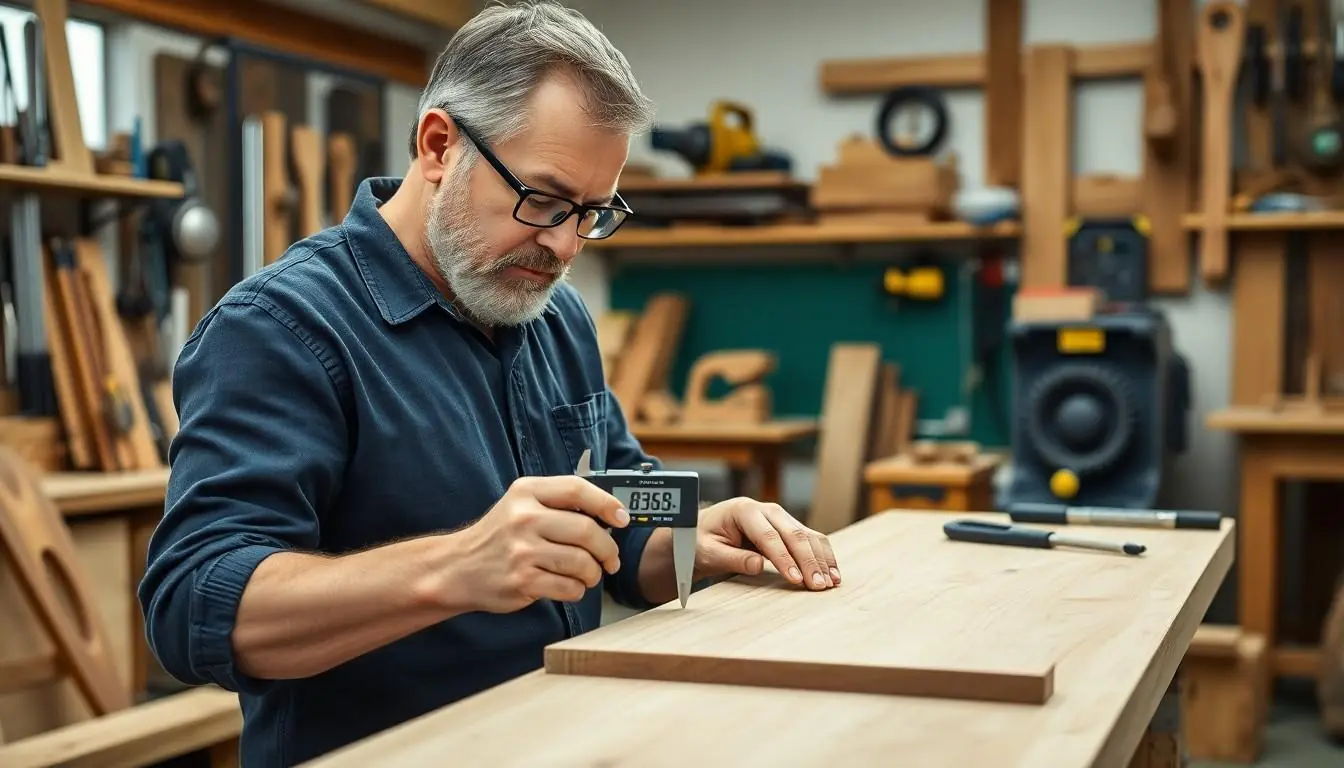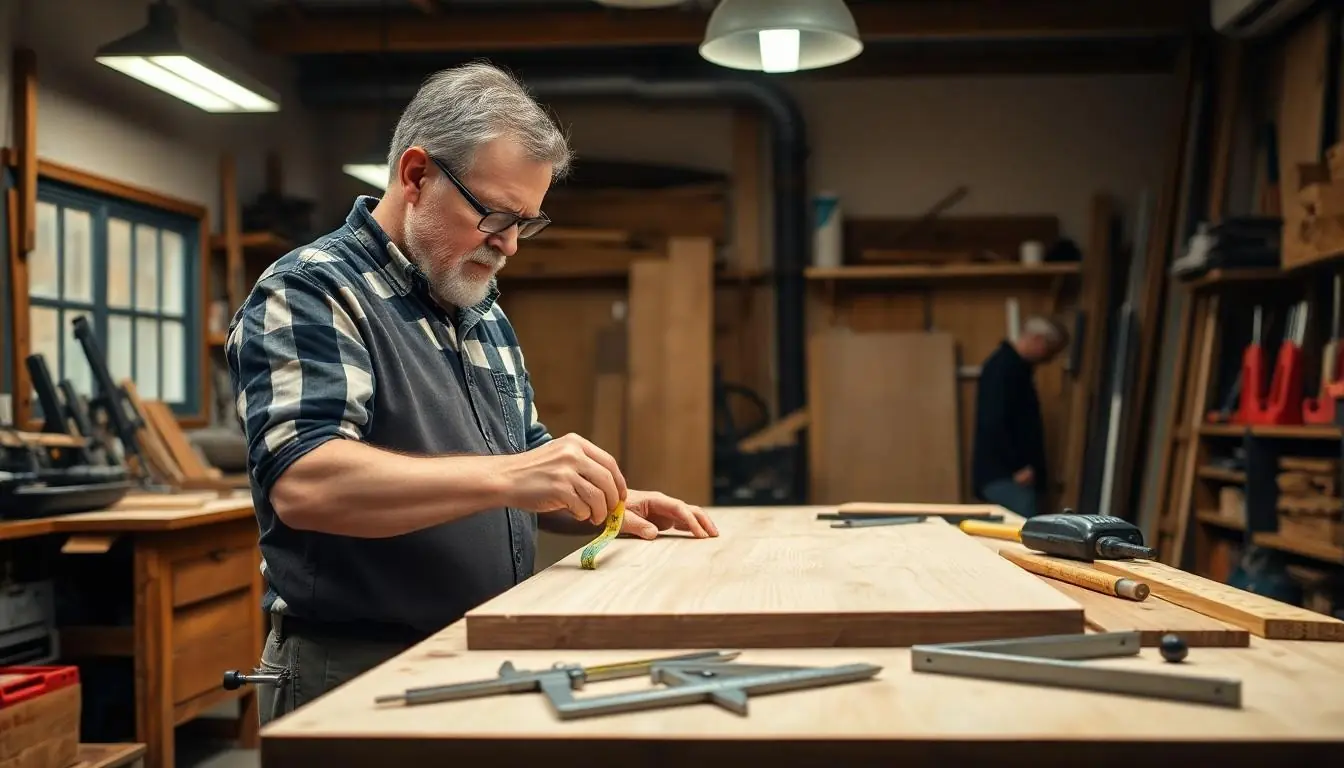In the world of workshops, measuring tools are like the unsung heroes of craftsmanship. Imagine trying to build a masterpiece without the trusty tape measure or the precision of a caliper. It’s like trying to bake a cake without a recipe—chaos is bound to ensue! These tools not only ensure accuracy but also save time and prevent those dreaded “oops” moments that can turn a project into a comedy of errors.
Table of Contents
ToggleOverview Of Measuring Tools In Workshop
Measuring tools serve as critical components in any workshop. Essential items such as tape measures, calipers, and squares ensure precision. Professionals rely on them to achieve accurate results in projects. A tape measure, for instance, offers flexibility and ease for measuring length across various surfaces. Calipers, on the other hand, deliver high precision for smaller dimensions and internal measurements.
Measurement tools enhance efficiency by reducing the likelihood of errors, which can lead to costly mistakes. Tools like protractors help in measuring angles, ensuring cuts are accurate. Levels assist in determining surfaces for projects, providing necessary balance and alignment. Each tool serves its unique purpose, contributing to overall success.
Digital measuring tools are becoming increasingly popular. They provide quick and precise readings, often with digital displays for easy interpretation. Laser distance meters, for example, measure distances with high accuracy over long ranges, making them ideal for large projects.
Maintaining these tools is crucial for their longevity and effectiveness. Regular calibration helps ensure measurements remain accurate over time. Proper storage protects tools from damage and extends their usable life.
Measuring tools in a workshop enhance craftsmanship and reduce errors. They offer various functions and levels of precision, catering to different needs. Prioritizing the use of reliable measuring tools supports high-quality work across all projects.
Importance Of Accurate Measurements

Accurate measurements play a vital role in woodworking, metalworking, and other crafting disciplines. Proper use of measuring tools directly influences the quality of the finished product.
Impact On Project Quality
Precision affects overall project quality significantly. Measurements determine dimensions for cuts, joints, and components. When dimensions deviate, the fit suffers, leading to structural weaknesses or aesthetic flaws. Accurate measurements prevent material waste, ensuring efficient use of resources. Delivering precise results enhances professional reputation and customer satisfaction. Crafting instruments like squares and calipers contribute high levels of accuracy, ultimately reflecting in project excellence.
Safety Considerations
Proper measurements also relate directly to safety in the workshop. Inaccurate measurements can lead to tool malfunctions or accidents during cutting and assembly. Ensuring measurements align prevents dangerous situations that may arise from improper fits. Tools like tape measures and digital levels enhance safety by minimizing human error. Regular tool calibration supports reliable readings, reinforcing a safer working environment. Ultimately, accurate measurements protect both the craftsman and the integrity of the project.
Types Of Measuring Tools
Measuring tools come in various types, each serving specific purposes in workshops. Understanding these different types enhances accuracy and efficiency in craftsmanship.
Linear Measuring Tools
Linear measuring tools are essential for measuring lengths and distances. Tape measures offer flexibility and can accommodate both small and large measurements. Rulers provide quick readings in straightforward applications. Calipers deliver precision, making them suitable for measuring internal and external dimensions, as well as depths. Each tool contributes to achieving the necessary accuracy required across various projects.
Angle Measuring Tools
Angle measuring tools assist in determining the angles of cuts and joints accurately. Protractors allow for easy measurement of angles during layout work. Bevel gauges help duplicate angles from existing pieces, enabling precise replication in woodworking and metalworking tasks. Combination squares serve dual purposes, allowing craftspeople to measure right angles and ensure consistent, straight lines. Together, these tools guarantee proper design and fit in completed projects.
Leveling Tools
Leveling tools play a critical role in establishing even surfaces and accurate alignments. Spirit levels indicate when a surface is horizontal or vertical, preventing misalignments during construction. Laser levels project clear lines across distances, making setups more efficient. These devices provide clear visual feedback, ensuring that builders achieve precise levels in various applications. Using leveling tools reduces the risk of structural inaccuracies and ensures quality in every project.
Selecting The Right Measuring Tool
Choosing the appropriate measuring tool significantly impacts project accuracy. Various factors dictate the ideal selection process.
Factors To Consider
Precision represents a primary factor when selecting a measuring tool. Tools such as calipers provide high accuracy for small components, while tape measures excel in measuring longer distances. Material type also matters; tougher materials may require specific tools designed for durability. User experience influences choices; beginners benefit from simple tools, while professionals may prefer advanced options, including digital measuring devices. Storage and portability take precedence as well; compact tools offer convenience for mobile workshops, whereas larger tools may not. Finally, budget considerations determine the range of tools one can afford, balancing quality and cost effectively.
Common Mistakes To Avoid
Overlooking tool compatibility ranks among the common mistakes. Each project type often necessitates distinct tools; failing to account for this leads to inaccurate measurements. Relying solely on one tool proves detrimental as varied applications demand different devices for optimal results. Ignoring maintenance can also lead to inaccuracies; regular calibration ensures continued precision. Neglecting to read instructions contributes to improper use accounts. Lastly, rushing through the measuring process often results in errors; taking the time for careful measurement ensures quality outcomes.
Maintenance Of Measuring Tools
Maintaining measuring tools ensures their accuracy and longevity. Regular calibration keeps tools like calipers and digital meters functioning at their best. Proper cleaning after each use prevents debris buildup, which could affect measurements.
Storage plays a key role in tool maintenance. Storing tape measures in a dry, dust-free environment helps prolong their lifespan. Using protective cases for calipers and digital tools prevents damage from impact or exposure to moisture.
Users should routinely inspect measuring tools for signs of wear. Checking for bent components or worn-out markings allows for early intervention. Replacing damaged parts or tools ensures measurement precision and overall project quality.
A calibration schedule aids in maintaining accuracy. Setting reminders every few months for recalibration helps keep tools in optimal condition. Following manufacturer guidelines provides essential information for maintaining specific tools.
Knowledge of specific maintenance requirements enhances tool performance. Understanding how temperature and humidity affect measurements can prevent inaccuracies. Users should adapt their maintenance practices based on the tool’s materials and design.
Investing time in maintenance proves beneficial in the long run. Accurate measurements support the integrity of projects in woodworking, metalworking, and more. Enhanced tool performance ultimately reduces errors and improves craftsmanship quality.
Measuring tools are indispensable in any workshop. They not only enhance precision but also contribute to the overall quality of craftsmanship. By selecting the right tools and maintaining them properly, craftsmen can significantly reduce errors and improve project outcomes.
Investing in a variety of measuring tools ensures versatility and adaptability across different tasks. Whether it’s a simple tape measure or advanced digital equipment, the choice of tools directly affects efficiency and safety.
Ultimately, accurate measurements are the foundation of successful projects. Prioritizing these tools will lead to better craftsmanship and a more rewarding workshop experience.

